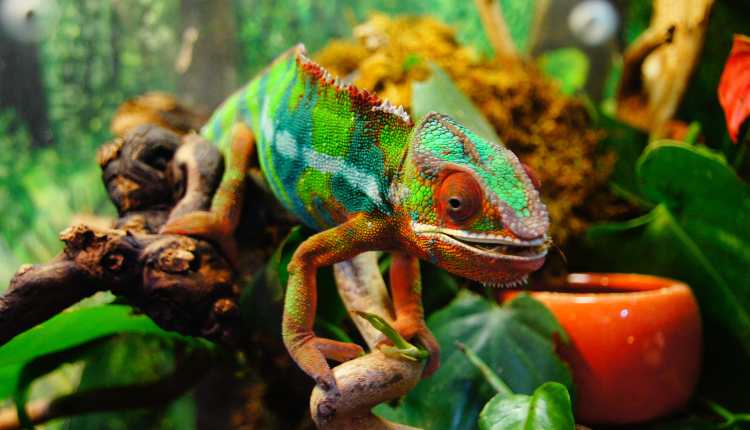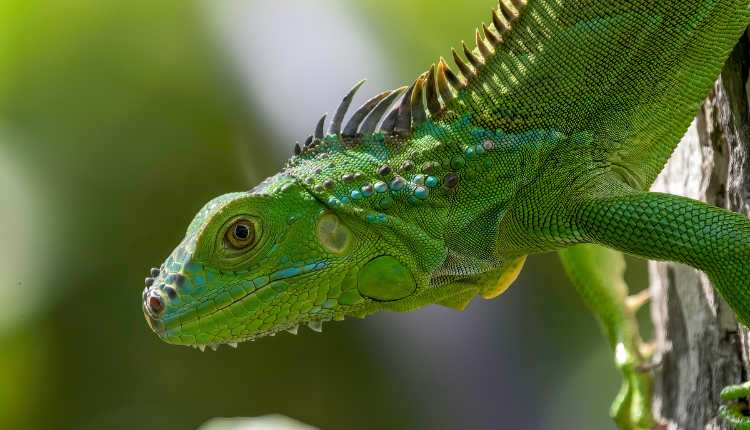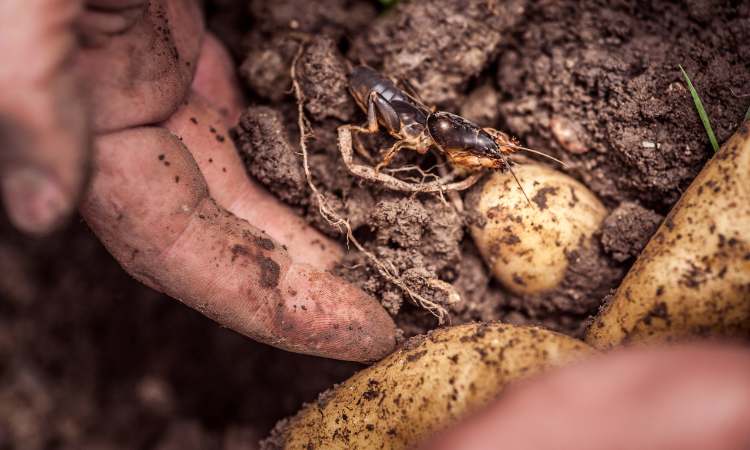To keep iguanas out of your vegetable garden, use physical barriers such as fences and nets. In addition, remove any food sources and create an unattractive environment through repellents like garlic spray or predator scents.
Some other ways to prevent Iguanas in your garden consist of an integrated mechanism of-
- Using tree Wrap
- Iguana Barriers
- Filling Burrows
- Loud noise
- Iguana-Resistant Plants
- Habitat modification
- Repellent
- Elevated garden bed
- Iguana trap
- Herb repellents
What Are The Best Methods To Keep Iguanas Out Of Your Garden?
Frankly speaking, the best methods to keep iguanas out of the garden basically depend on the garden type, location, size, planning, and availability of iguanas.
Though it looks agile and dangerous for the garden, with some measures, you can easily get them out of your garden.
These methods are discussed below-
1) Using Iguana Barriers
As a gardener, you definitely know that the first and foremost security of your garden is fencing with suitable barriers.
You should use such barriers that are workable for multiple rodent pests. Suppose, you choose the small mesh netting of the perimeter of your garden. It will work for Iguanas, chipmunks, chickens, rabbits, or squirrels in your garden.
So, in the long run, choose a physical barrier, or net that can protect your garden from multiple attacks.
Choose a fence that is at least 4 feet tall and 6 inches deep down to the soil. However, 6 feet 6-foot-tall fence is overall the best option for fencing keeping in mind other pests.
In my observation, a wire mesh of 10-12 gauge with half-inch squares peacefully eradicates this creature from your garden to enter without your permission.
2) Using tree Wrap
Tree Wrap is one of the important techniques to prevent iguanas in your garden. It is applicable when your garden has several trees and iguanas climbing on it.
To reduce the problem, you can take steps by implementing the metal sheets over the ground of 1.5 Meter height and placing them around the trees.
This method is universally appreciated for eradicating rodent pests that climb on trees. Some of these are-
- Roof rats
- Squirrels
- Chipmunks.
If you’re doing these techniques for iguanas you’re basically doing it also for keep away from these also.

3) Filling Burrows
Iguanas are lizards that like to eat plants and make little holes in the ground where they live. But these holes can mess up our lawns and paths in the garden.
Iguanas can also leave yucky poop that smells bad and doesn’t look nice. What’s worse is that they can carry a germ called salmonella, which can make people sick.
So whenever you see that kind of hole in your garden, and if you think it’s probably because of iguanas, you should fill it.
Most gardeners are asked how to fill iguana holes.
The easiest way to do that is to use small pebbles or rocks to cover it. And if possible use bleaching powder is a great way to minimize the further entry of the same place.
Bleach consists of a corrosive chemical that does not suit the iguana’s body, so in the end, Iguanas will leave the place.
Read Also: How to Keep Squirrels and Rabbits Out of the Garden?
4) Loud noise
Though human can’t hear the noise range from below- 20 hartz to over 20,000 hartz. But iguanas and other rodent pests can hear.
That is why if you use an ultrasonic device or manual sound device to deter them, it will be very effective.
You can easily choose different ultrasonic devices from online shops and settle in the garden area.
However, if the iguana population is minimal or found once a day, then hand-made sound is enough for that.
You can use two steel bowls and make noise or even an ironic sound that works well.
5) Iguana-Resistant Plants
In simple words, Iguanas are herbivorous reptiles that may eat a variety of plants.
While there is no plant that is completely iguana-proof, there are certain types of plants that iguanas are less likely to consume due to their taste or texture.
Here are some plants that are often considered to be more iguana-resistant:
- Agave
- Aloe Vera
- Cacti
- Rosemary
- Lavender
- Sage
- Lantana
- Salvia
- Succulents
- Pepper Plants
If your garden has enough space, then you can decide to plant some of the types in the garden.

6) Habitat modification
As with all rodent pests, iguanas can be kept away from the garden by taking several steps.
In this case, habitat modification is necessary. If your bins are always open and waste food is kept here and there, then these creatures will attract easily.
To keep away, decrease, or minimize all components that iguana loves. In the garden, iguanas are always looking for
- Edible Plants
- Leafy Greens
- Tender Shoots and Young Growth
- Moisture Sources
- Warm, Sunny Spots
- Hiding Places
- Compost Piles
- Fruit Trees
So, keep in mind these factors when you establish the new site of your garden. If the garden is already done then peacefully maintain the above term to protect the plant by removing dust, waste food, etc.
Always try to add water features into your garden like ponds, water garden, etc Iguanas are not good swimmer, so it naturally avoids place where water is present.

7) Repellent
Hot pepper sauce has special characteristics to deter iguanas from your garden. It can’t tolerate spicy smells and block their sense. So spicy pepper is a great option to make a homemade repellent for iguanas.
Here are the steps. That you can make this solution-
- Get a spray bottle that you can use for this purpose.
- Add 2 tablespoons of pepper sauce to the spray bottle.
- Fill the rest of the bottle with water, and then shake it really well to mix everything together.
- Now, you can spray this mixture near the plants that iguanas like to eat.
Safety Tips for Gardeners:
Be aware of using pepper sauce because it will impart and irritate your eyes.
Don’t directly use this solution with barehand. Must use hand-gloves if you have to touch the some way of the solution.
One important thing is that the pepper solution is quite highly concentrated and inhibits bees from entering your garden.
So if you’re vegetables are in flowering stages or have a flower garden, do this exactly where it really needs to deter iguanas.
8) Elevated garden bed
Raised garden beds are most of the time unreachable for iguanas entry. Generally, a raised bed is about 1 foot in height and supported with a wooden square-shaped box or concrete.
Besides the elevated garden bed can be easily covered with fence or hard clothing meshes to reduce this problem.
But if your garden has a lot of raised garden beds, then it will be a good idea to fence or net the whole of the garden.
Otherwise, you can implement other techniques along with this.
Read More: How Often To Water Raised Bed Garden?

9) Iguana trap
It sounds like killing iguanas, but no. Iguana traps are as simple as catching them.
You can make it at home with simple tools and accessories.
Materials You’ll Need:
- Large, sturdy box or crate with a lid.
- Long stick or pole.
- Piece of string or twine.
- Leafy green vegetables (like lettuce or kale) as bait.
How to Make Iguana Cage:
- Get a big box with a lid. ( The cage should be approximately 6 feet tall, 3 to 6 feet wide, and 10 to 12 feet in length. )
- Find a long stick and a piece of string.
- Put some leafy green veggies in the box.
- Use the stick and string to keep the box lid open.
- Wait quietly for the iguana to come and eat the veggies.
- When the iguana moves the stick, the lid will close and catch it
- Carefully pick up the box with the iguana inside.
- Take the iguana to a safe place and let it go.
- Make sure to follow any rules about catching iguanas in your area.
- Be gentle and kind to animals when you catch them
10) Garlic Spray or Predator Scents.
Every rodent pest population often shows negativity on some fragrances and scents.
In this case, if the garden has iguanas and they want to destroy the plants, you can use these scents to deter them.
Spraying garlic solution is a better way. You can do it by mixing the garlic paste and keeping it sprayed on every entry point of the garden.
Predators’ scents mostly deter them because of their existence in the garden. A suggestion that contains Coyote Pee may keep iguanas out of the garden. Truly speaking I didn’t use this technique on my own.
Can mulching be used to deter iguanas?
Mulching is an effective way to keep iguanas away from your vegetable garden. Here’s how it works:
- Spread a thick layer of mulch around your plants and beds.
- Iguanas dislike the texture and smell of mulch, which can deter them from entering your garden.
- Choose mulch materials like coarse wood chips, pine needles, or crushed stones, which iguanas find unpleasant to walk on.
- Reapply mulch as needed to maintain its effectiveness.
Are you considering installing motion-activated devices?
Yes, installing motion-activated devices can be a helpful strategy for deterring iguanas from your garden. These devices can startle iguanas when they approach, making them less likely to enter and damage your plants.
Besides, this device not only protects your garden from iguanas but also helps to deter other animals from chickens in your garden to chipmunks even though rabbits and squirrels.
All of these creatures will easily be deterred by motion-activated sprinkling devices.
Frequently Asked Questions
How Do I Keep Iguanas From Eating My Garden?
Though I mentioned some effective ways before but furthermore some methods may be effective in not eating garden crops by iguanas are-
- Using coffee grounds, on plants
- Use bleaching powder solution
- using Epsom salts
However, other than that, to keep iguanas from eating your garden, try these effective methods: –
- Use mesh or fencing to create a barrier around your garden.
- Plant strong-smelling herbs like rosemary or lavender, which deter iguanas.
- Install motion-activated sprinklers to startle and discourage them.
- Place fake predators like owl decoys to scare away the iguanas.
I hope that if you implement these techniques and create a plan that incorporates some of the methods I have just shared with you, it will be effective in deterring iguanas.

What Smells Keep Iguanas Away?
Iguanas have a very keen sense of smell but if they get one then they will attract surrey. From my previous research and experience, I can share with you some of the components that they hate most are-
| Smells That Can Help Keep Iguanas Away | Additional Smells |
| Hot Peppers | Rosemary |
| Garlic | Thyme |
| Onions | Basil |
| Vinegar | Oregano |
| Citrus | Lemongrass |
| Mint | Clove |
| Lavender | Peppermint |
| Eucalyptus | Sage |
| Cinnamon | Marigolds (insects deterrent) |
| Essential Oils | Catnip (strong deterrent for some iguanas) |
What Is The Best Deterrent For Iguanas?
The best way to deter iguanas is to create a barrier that they cannot cross. This can be done by installing a fence or using repellent sprays.
Fences should be at least 6 feet tall and made of a material that iguanas cannot climb, such as chicken wire or hardware cloth.
Repellent sprays can be purchased at most hardware stores and should be applied to the fence or other areas where iguanas are likely to enter.
In addition to physical barriers, there are a few other things you can do to deter iguanas. These include:
- Removing any food sources that may attract iguanas, such as fallen fruit or birdseed.
- Keeping your yard clean and free of debris that iguanas can use as shelter.
- Installing motion-sensor lights or sprinklers to scare away iguanas.
Conclusion
From the above article, it is clear that if you can naturally repel the iguanas our mentioned methods will be enough to do that. However, in some cases may be some customization to completely eradicate the iguanas from the garden.
And in the final stages, if everything fails, please call a professional wildlife removal company if you have a large iguana problem.
Reference:
https://edis.ifas.ufl.edu/publication/IN528
https://sfyl.ifas.ufl.edu/archive/hot_topics/lawn_and_garden/iguanas_landscape.shtml
https://www.wikihow.com/Keep-Iguanas-out-of-Your-Yard-or-Garden
I am a graduate of Bangladesh Agricultural University, where I delved into various agricultural disciplines, equipping me with a profound understanding of agriculture. Beyond academics, I have hands-on experience in gardening and crop cultivation. My passion is to embrace sustainable farming and horticulture. With a BSc in Agriculture, I am dedicated to promoting environmentally conscious and efficient agrarian practices.
Bachelor of Science (BSc) in Agriculture (Hons.)
Master of Science. (Sustainable Agriculture & Food Security ) (MS)
Bangladesh Agricultural University




